- Home
- Jess Walter
The Cold Millions
The Cold Millions Read online
Map
Map copyright © Springer Cartographics
Dedication
To my father, Bruce, and my brother, Ralph
Contents
Cover
Title Page
Map
Dedication
Waterbury, 1909
Part I
Chapter 1
Chapter 2
Chapter 3
Chapter 4
Chapter 5
The Kid, 1864
Chapter 6
Chapter 7
Chapter 8
Chapter 9
Chapter 10
Jules, 1909
Part II
Chapter 11
Chapter 12
Gemma
Chapter 13
Chapter 14
Chapter 15
Ursula the Great
Chapter 16
Chapter 17
Chapter 18
Del Dalveaux
Part III
Chapter 19
Chapter 20
Chapter 21
Chapter 22
Chapter 23
Del Dalveaux, 1909
Chapter 24
Chapter 25
Chapter 26
Gurley
Chapter 27
Chapter 28
Chapter 29
Chapter 30
Gig
Part IV
Chapter 31
Chapter 32
Chapter 33
Gig
Chapter 34
Chapter 35
Chapter 36
Gig, 1910
Chapter 37
Sullivan, 1911
Epilogue
Rye, 1964
Acknowledgments
About the Author
Also by Jess Walter
Copyright
About the Publisher
Waterbury, 1909
DARKNESS CAME on that town like a candle being snuffed. This was my wife’s primary complaint about Spokane after two years of me copping there, what Rebecca called the “drastic dark” of autumn. We’d come from Sioux City, a town she still called home, and where I’d walked an easier beat. I found Spokane in a land-spec ad, but the piece I bought turned out to be cliff-face basalt and not arable, so we took four rooms in a brick apartment north of the river, and I got on with that roughneck police force. These were hard years, ’08 and ’09, everything about Spokane hard, bringing to mind Rebecca’s word, drastic. Steep hills, deep canyons, cold winters, hot summers, and those dark autumn evenings that made her so melancholy, when five felt like midnight.
It was one of those nights Chief Sullivan pulled me aside. A burglar was prowling the big houses on Cannon Hill, and he needed good, sober cops on it. Nothing got up the mayor’s ass like someone prying south-side windows, stealing candlesticks from the Victorians on the hill, the mayor quick to remind Sullivan that he was acting police chief and his act was to make the moneyed wives of those mining millionaires feel safe. Sullivan assigned me and two other cops to patrol the lower South Hill and catch this master burglar.
It was vagrant season. “So all’s you’ll miss is bum harvest,” Chief Sullivan said. Good by me, as I preferred real police work to the endless roust-and-run of tramps anyway.
Sullivan talked up this South Hill window-crawler like he was the dastardly demon of hell himself. One of the silver barons had threatened to bring in a Pinkerton, and nothing ate at Sullivan like someone hiring private. There were six detective agencies in Spokane, three nationals—Pinkerton, Thiel, and Allied—and three local thug shops used by the mining companies for union busting. The national detectives treated us city cops like horse clods, fine for running bums and whores but about as helpful solving crime as a blind ranch dog. I thought this perception not entirely unfair, and had complained more than once about the laziness and graft of the old brute cops. I’d even considered putting in papers with the privates myself.
If I stayed a cop, it would be for John Sullivan, for I admired the man. Sully was honest and affable, off-the-boat County Kerry, six-four and 220, five of those pounds brush mustache. He’d come on the force just after the Great Fire of ’89, with brutes like Shannon and Clegg, and to hear them tell it, those three had singlehandedly driven out the last of the Indians and tamed the whole frontier town.
But unlike those others, Sullivan wasn’t only brute. He was brave. Savvy. In ’01 two holdup men set up shop on the north end of Howard Bridge, like fairy tale ogres, robbing every wagon that crossed. When Sullivan came to arrest them, one man pulled a pistol and squeezed off a couple before big John could knock the gun from his hand. As he was beating the robbers, Sully realized his boot was filling with blood. The ogre had shot him in the leg, below the groin. He dragged both outlaws to jail, then rode his horse to the hospital, where he promptly underwent surgery, met a nurse half his age, and married her.
How could you not want to work for such a man?
Sully could grow nostalgic for the rough old days, but he was also clear: the old Klondike town had grown into a proper city and the time was up for a brute like Clegg, who saw his job as hassling tramps and whores into paying him for protection, and was not above running a girl himself if she came up short. “Nah, it’s the last shift for them old boys,” Sullivan said when I complained about Clegg taking booze from the evidence room.
He made a point of promoting cops like Hage and Roff and me, for our brains and our rectitude, I guess, but also because we didn’t care if Bill Shannon could throw a keg through a window, or that Hub Clegg once rode a patrol horse through a burning tavern to rescue a favored sporting girl.
That’s why he put us three on the Cannon Hill burglar. But three men was a big commitment during vagrant season, with the east end full of floaters and union men coming from all over to agitate the Stevens Street job agencies. I was not unsympathetic to their cause, for there was no denying the corruption of those employment agents, who charged the poorest men a dollar for suspect job leads. But the IWW protested by filling the town with stinking foreign rabble, and this brought out the tavern girls, opium and faro boys, mystics, seers, and pickpockets, a cloud of vice that swarmed the tenderloin like mayflies over a putrid stream.
“Take this window thief down fast, boys,” Sullivan told us, “for we’ll need your batons the other side of it.”
And so, Hage and Roff and I ventured out into that cold dark evening. We took an empty trolley up the South Hill, got off at the first stop. We were in plainclothes and overcoats, with fur hats for warmth and so my bald head wouldn’t reflect the streetlights. The plan was for Hage to amble the alleys while I walked the street in front and Roff the street behind. We’d square each block this way, work our way up the hill starting at Seventh. There was a low ceiling of chimney smoke, and the streetlights cast shadows long and eerie. As I walked, I peered past split curtains into grand houses that burned gold with wood fire and candlelight, and I missed my own home fire, Rebecca and the kids, the night so cold and quiet I doubted our thief could be afoot.
After Seventh, Hage and I met on Adams, at the alley entrance, where Roff had stopped to piss on the knuckled root of a maple.
“I don’t like it,” Hage said.
“Roff pissing on trees?”
“I don’t like that, either, but I mean walking up this hill hoping to bump into some ace burglar on the job.”
“Well, we won’t find him rousting bums downtown with Clegg.”
“We will if he’s a bum.”
“Fancy work for a bum.”
“I suppose so.”
Roff had finished pissing. We turned the next block and split up again at Ninth, where I was admiring the pillared porches of the big houses and paused
to light my pipe. I wondered then if Rebecca’s feelings about Spokane might change if I could ever get us off poverty flats and into one of these grand houses on the hillside.
Wasn’t likely on a cop’s salary; Chief Sullivan himself lived in the flats. Anyway, I didn’t think even these grand houses could make my wife happy. Not anymore. Not here. What was it about these steep, western, water-locked cities—Seattle, Spokane, San Francisco? All three I’d visited, and in all three, the money flowed straight uphill. It made me think of something I’d heard about the Orient, that water drained the opposite way there. Who wanted to live in a place where water spun backward or money flowed uphill? These towns that had no business being towns, straddling islands and bays and cliffs and canyons and waterfalls.
I fell deeper into this somber mood and was thinking Rebecca’s word, drastic, when Roff stepped from the shadows.
“You got something?” I asked. “Or—”
I couldn’t say what came next: the crack, me yelling, “Stop,” or the flash, or realizing this wasn’t Roff. As to what came last, I have no doubts, for I doubled over and held my flaming, open guts. There was another order that made sense (not Roff, “Stop,” flash, crack, doubled over, flaming guts), but I couldn’t place it—
The man who was not Roff was running away, his long black coat flapping, his shoes clicking on cobblestone, and I thought of Sullivan taking a gunshot to the leg and still bringing in his man, and I managed to get my revolver and squeeze four off, but I fired wildly and the man ducked between two houses down the block.
I was folded in half, pitched forward on my knees in gravel, my guts a sinkhole, and I cried out, to my shame—
Hage was first to me, saying my name over and over, “Alfred, Alfred, Alfred.”
“He shot me!” What grave disappointment, my lack of imagination. When I think of all the things a man could say. Shakespeare or Greek or even the Bible. Proper last words. But all I could manage was “He shot me.”
“I know, Alfred,” Hage said. “I’m sorry.”
Hage reached into my coat, around to my back. “Roff!” he yelled. I could hear in his voice that there was no exit hole. The bullet was inside. They would have to go for it.
I’d heard from the old cops that a mortal wound did not hurt as much, but this, like everything about the brutes, every word out of their fat mouths, was a fairy tale, a justification, a pernicious lie.
“Roff!” Hage yelled. “Waterbury’s shot!”
“How could they know?” I said.
“What?”
“How could they know what a mortal wound feels like?” Even to my ear the words were garbled, like I was talking underwater. My thoughts, too, leaked out: A gut shot could take hours, days, but the result was the same: agony and—
Other thoughts crowded: Had I eaten dinner? Was that to be my last meal? Who would tell Rebecca? Would she mend this shirt? Maybe she could sell my clothes and make a little money. I reached down to feel if the bullet had gone through my coat.
“Coat’s fine,” I said, but my voice sounded far off.
“Roff!” Hage yelled again. “He shot Alfred!”
“Lay me down,” I said, and Hage helped me onto my side.
“Roff!” Hage yelled again.
“Rebecca,” I said, but it was bubbles in water. I wanted to make sure that she knew—what? I could not think. “Rebecca,” I said again, clearer this time. And even if I had memorized all of Shakespeare and the Bible, I suppose this is what I would have wanted to say at the end, Rebecca on my lips, Rebecca, Rebecca, over and over, into the dark.
Part I
. . . we love most what we must have but can never have; and so on we go, west and then west.
—Brian Doyle, The Plover
1
They woke on a ball field—bums, tramps, hobos, stiffs. Two dozen of them spread out on bedrolls and blankets in a narrow floodplain just below the skid, past taverns, tanners, and tents, shotgun shacks hung like hounds’ tongues over the Spokane River. Seasonal work over, they floated in from mines and farms and log camps, filled every flop and boardinghouse, slept in parks and alleys and the pavilions of traveling preachers and, on the night just past, this abandoned ball field, its infield littered with itinerants, vagrants, floaters, Americans.
The sun was just beginning to edge the mountains when Rye Dolan sat up, halfway down the first-base line. He looked across a field of sleeping humps, his older brother, Gig, beside him, curled a few feet from the pitcher’s mound.
Rye turned back to watch the sunrise over the Selkirks—a smoky red gash where someone had set a fire to get a job fighting it. Last year, Rye might have paid to get a shovel on that blaze, but Gig had gone and joined the IWW, the union fighting the corrupt employment agents who charged a buck for job leads.
Left untended, that same dollar could bring his older brother plenty of trouble. Like last night.
Pay in pocket, Gig Dolan liked to bounce from Dutch Jake’s to Jimmy Durkin’s until the money ran out. And while caring for Rye the past year had half tamed him, they were coming off three weeks apart—Rye picking up a late harvest near Rockford, Gig getting on a skid crew at a Springdale log camp. Fired for union agitating, Gig came back to booze it up with his east-end labor pals and hawk daywork at the city’s vaudeville theaters, and it was there, among the freaks and jugglers, the variety houses and leg shows, that he happened to meet an actress, name of Ursula—Rye back in Spokane less than an hour before his brother was showing him a newspaper review of her show. “And therein,” Gig said.
“I’m at the Comique Theater last week hauling lumber for the carpenter when this red-haired vision emerges from her dressing room and says, ‘Well, who are you?’ and I say, ‘Why, the hero, of course,’ and she says, ‘Then you must get the damsel,’ and I say, ‘Every night. Twice on Saturdays.’ And she says, ‘I’ll bet that second performance really suffers.’ And I smile back and say, ‘Oh, I don’t know. Goes on longer, but what’s lost in zeal gets made up in familiarity.’ ”
She went by the name Ursula the Great, the Spokesman-Review referring to her as “a spectacle of indecency” and “the last of four acts of increasing depravity.” Gig talked Rye into using their sock money on a shared public bath—older brother taking the suitor’s hot, Rye settling for warm flotsam—and they got haircuts and nickel shaves, though a scrape was hardly needed on Rye’s baby face, and instead of boiling clothes over a cook fire, they paid for proper clean-and-folds in the Chinese Quarter. All gentlemanned up, they got fifty-cent seats at the Comique and settled in for some mild depravity—blind accordion player, Bavarian juggler, wrestling match between armless and legless men (always bet legs)—until the curtain split for the finale, depravity number four, and the smoky stage lights revealed the source of Gig’s infatuation, Rye wondering what pinch-hearted critic came up with a word like depraved upon first glimpsing the flame-haired beauty who strode into the lights in front of a big iron cage—
For inside was a full-grown cougar! Pacing and snarling while the band played a hurdy-gurdy and the big cat stalked and Ursula danced around it singing a few numbers and slow-stripping to nothing but corset and stockings, kicking those long legs higher and higher, leaning her backside against the cage until all went black and the spotlight came up and the whole theater held its breath as Ursula unlatched the cage door and the big cat lowered its head, hissed, and spat—and brave Ursula ambled in as if going to her pantry for butter, closed the cage door behind her, and serenaded the beast, holding an ungodly high note as she ripped off the corset, and oh! the flash of flesh, of narrow waist and pale back, and the fury of that mountain lion as it made to pounce at her bare breasts—which Rye could only imagine, as she was facing away—and that was when Ursula tossed the corset at the cat, who tore into it in lieu of her fair skin, and drowned out by cheers and whistles, she took a silk robe from the back of the cage, slipped it on, tied the belt, and, still singing over the roar of cat and crowd, Ursula the Great walked out of
that cage in one lovely piece.
Rye had to agree: This Ursula was the real thing. Made the blind accordion player seem like . . . a blind accordion player. Afterward, Rye ran the aisles for leftover food, but Gig was smitten, and when Gig was smitten, by cause or by woman, there was no sense in him, and he dragged them out of that warm theater and down the alley to the stage door.
A thick doorman was manning that post, and even with the brothers’ freshly shaved faces and laundered shirts, he wasn’t about to let such worn boots in to see the talent. Gig pleaded, but the doorman explained: Ursula was otherwise engaged, and for two bits he said how, entertaining a gentleman, and for two bits more, who, a wealthy mining man named Lemuel Brand. The Dolans had been sharked by enough of Lem Brand’s operations to know it didn’t matter how charming and handsome Gig was, a skid-rower like him was no match for a man of means like Brand, so they started back up the alley, Rye saying, “I hope the cougar wins next time,” when a call came from the stage door—“Gregory!”—and Ursula, still in the robe, emerged into flickering gaslight. “Gregory,” she called again, like she hadn’t hit the note the first time, and he ran down the alley to her. Gig listened as Miss Great explained, shoving his hands in his trouser pockets at the bad news, Ursula touching his chest, Gig nodding, turning and leaving her at the stage door, returning to Rye at the end of the alley. She watched him go, hand on heart, Gig refusing her the satisfaction of looking back.
“Well?”
“She swears she won’t bed the man,” said Gig, “but he owns the theater, so—”
And with no words on the other side of that so, they ventured back onto the street to salve Gig’s wounded soul.
Two hundred fifty taverns in Spokane and last night every one of them hummed on high, like a pot before boil, street cops looking for drunks to rake and the tenderloin packed with the end of harvest, the closing of log camps and the coming union action, downtown whipped up like a wind-fed blaze. A week earlier, a union speaker had gotten arrested and word went out in the Industrial Worker newspaper for floaters to come for the Spokane Free Speech Fight, bums dropping like apples from boxcars and rail trusses—humps from Chicago, Denver, Seattle: white, black, Indian, Chinese, Cossack, Irish, Italian, Finn—barstools and benches bent with their backs, Rye marveling at the endless babble of Celestial-Russo-Flemy-Serb-Salish-Spanish.

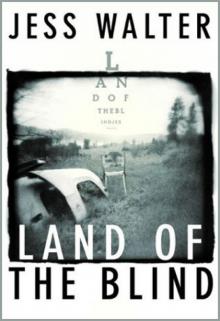 Land of the Blind
Land of the Blind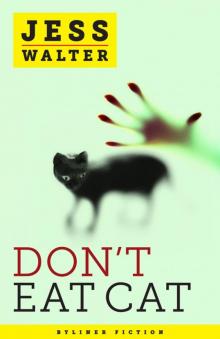 Don't Eat Cat
Don't Eat Cat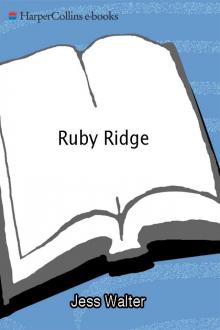 Ruby Ridge: The Truth and Tragedy of the Randy Weaver Family
Ruby Ridge: The Truth and Tragedy of the Randy Weaver Family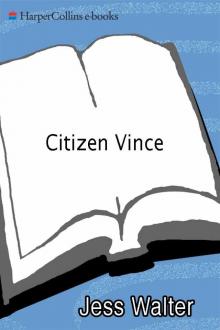 Citizen Vince
Citizen Vince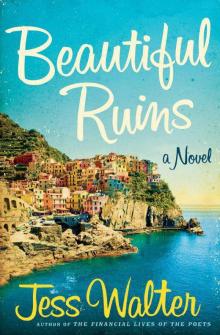 Beautiful Ruins
Beautiful Ruins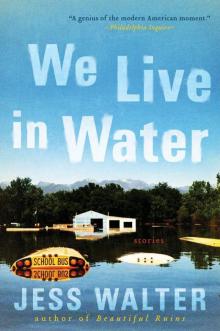 We Live in Water
We Live in Water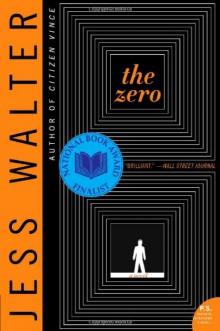 The Zero: A Novel
The Zero: A Novel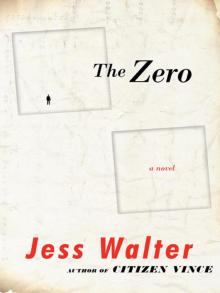 The Zero
The Zero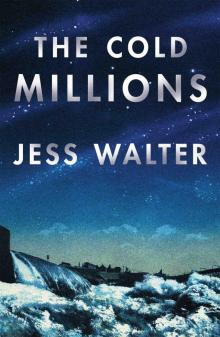 The Cold Millions
The Cold Millions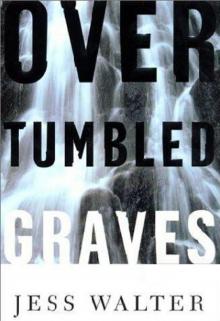 Over Tumbled Graves
Over Tumbled Graves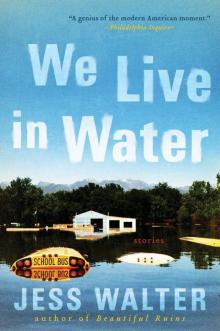 We Live in Water: Stories
We Live in Water: Stories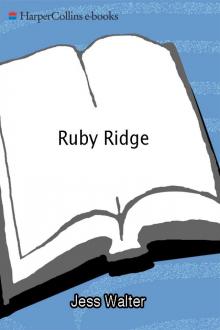 Ruby Ridge
Ruby Ridge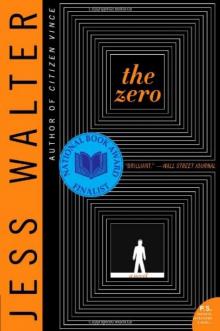 (2006) The Zero
(2006) The Zero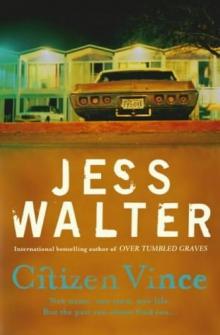 (2004) Citizen Vince
(2004) Citizen Vince